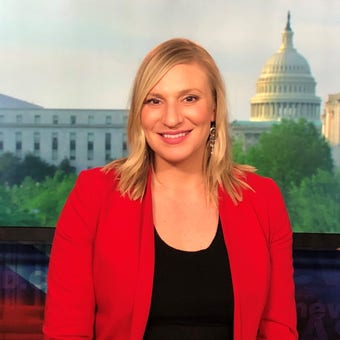Dr. Fauci on COVID lockdowns
Dr. Anthony Fauci joins 'America Reports' to discuss the latest measures to combat the coronavirus pandemic and the economic effects of lockdowns.
Dr. Anthony Fauci backed new Centers for Disease Control and Prevention (CDC) findings that suggest schools can reopen safely during the coronavirus pandemic, despite President Biden's chief of staff previously downplaying the positive scientific research.
In an interview with MSNBC's "Morning Joe" on Thursday, Fauci was asked if schools should be open given the new CDC research that found coronavirus transmission at schools was very low when mask-wearing and social distancing measures were taken.
"I would back the CDC recommendations because that is really based on data," Fauci, Biden's chief medical adviser, told the network. "We didn't fully appreciate that early on. But the fact is that when you look at a community and look at the penetrance of the virus in the community and its spread at the community level, compared to the school in that community, it's less likely for a child to get infected in the school setting than if they were just in the community."
Fauci said he understands it's "not an easy issue" for teachers given their safety concerns, but given the science, "We need to try and get the children back to school and that's the goal of President Biden that in the next 100 days to get the K-to-eight (students) back in school."
CDC researchers published their work on Jan. 26 in the Journal of the American Medical Association, and their findings have been touted by school-opening advocates and GOP leaders.
"There has been little evidence that schools have contributed meaningfully to increased community transmission," they wrote.
The researchers pointed to a report released by the CDC on Jan. 26 based on data from 17 rural K-12 Wisconsin schools that found coronavirus spread in schools was lower than that in the broader community.

In this Jan. 21, 2021, photo, Dr. Anthony Fauci, director of the National Institute of Allergy and Infectious Diseases, speaks with reporters in the James Brady Press Briefing Room at the White House in Washington. (AP Photo/Alex Brandon) ((AP Photo/Alex Brandon))
Parents and students in many communities around the country are at a boiling point as schools still are not fully reopen 11 months into the pandemic despite a better understanding of how to stop the spread and science suggesting schools can operate safely.
VIRGINIA PARENT BOILS OVER IN FRUSTRATION AGAINST SCHOOL SHUTDOWN: VIDEO
School-reopening data tracked by Burbio.com found as of Friday that 38% of U.S. K-12 public school students are still attending "virtual-only" schools and about 38% of students are attending traditional in-person school every day. The rest of the students are getting their education in a hybrid format, according to data shared with Fox News.
Teachers' unions have resisted plans to reopen schools in places like Chicago and Montclair, N.J., citing safety concerns.
White House chief of staff Ron Klain defended the teachers' unions when pressed about the CDC study during an interview on CNN. Anchor Erin Burnett asked him why "the unions in many cases are overruling what the studies show?"
"I don't think unions are overruling studies," Klain responded during the Jan. 26 interview. "I think what you're seeing is schools that haven't made the investments to keep the students safe."
Klain seemed to downplay the CDC study as being unique to rural Wisconsin and not necessarily applicable to other communities that didn't have money to invest in smaller class sizes.
"What that study in Wisconsin from the CDC showed was the 17 rural schools that got a sizable grant from a private foundation to put in the kinds of safety measures they needed -- students in very small pods classes of about 11 or 12 distanced in a rural area -- they could go to school safely," he said.
WHAT'S IN BIDEN'S $1.9T STIMULUS PLAN?
Klain said the biggest barrier to schools reopening is money, which the Biden administration is trying to remedy with the $1.9 trillion COVID relief package.
"Most of the teachers I talked to, they want to be back in the classroom. They just want to know that it's safe, and we as a country should make the investments to make it safe," Klain said.















































